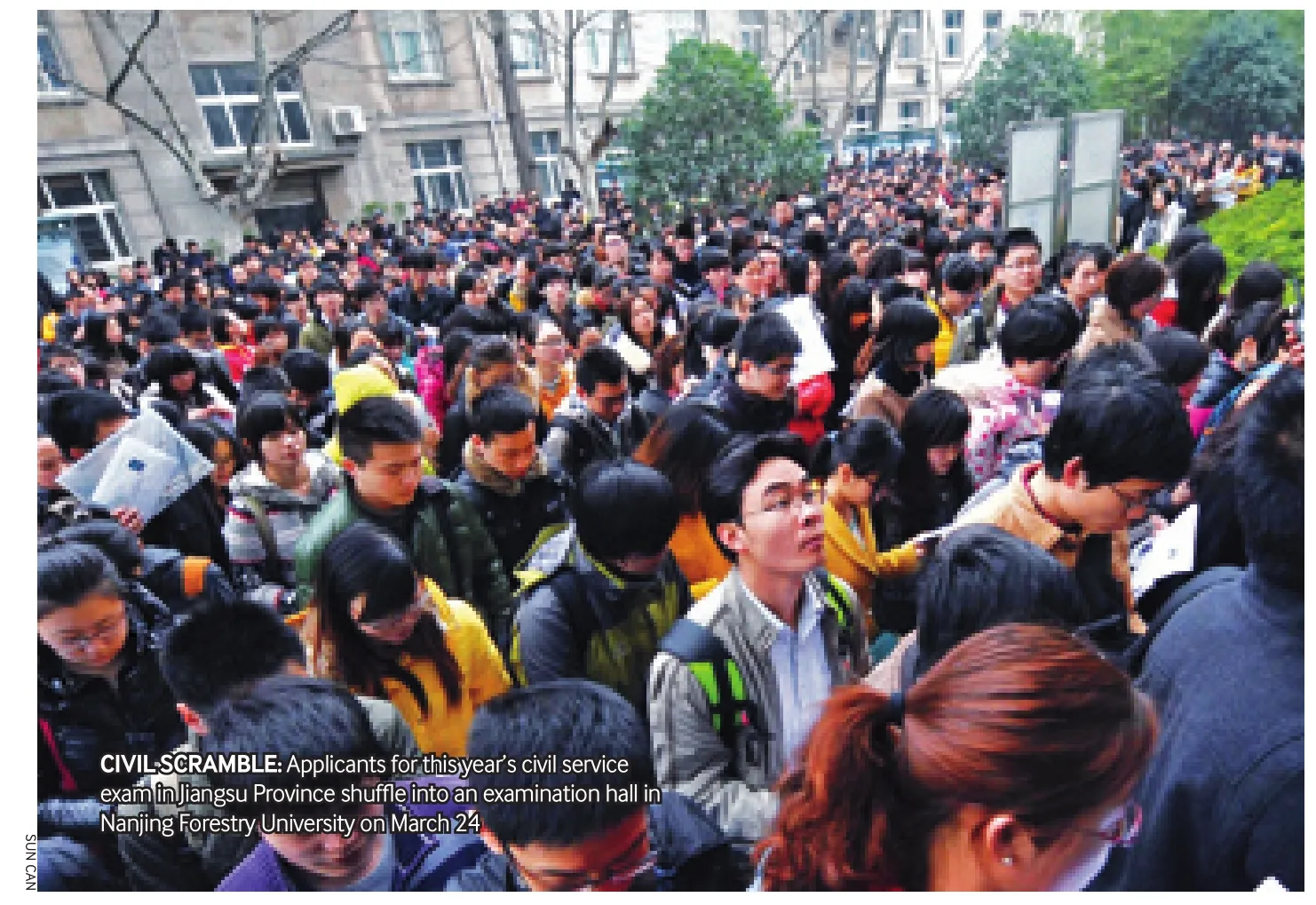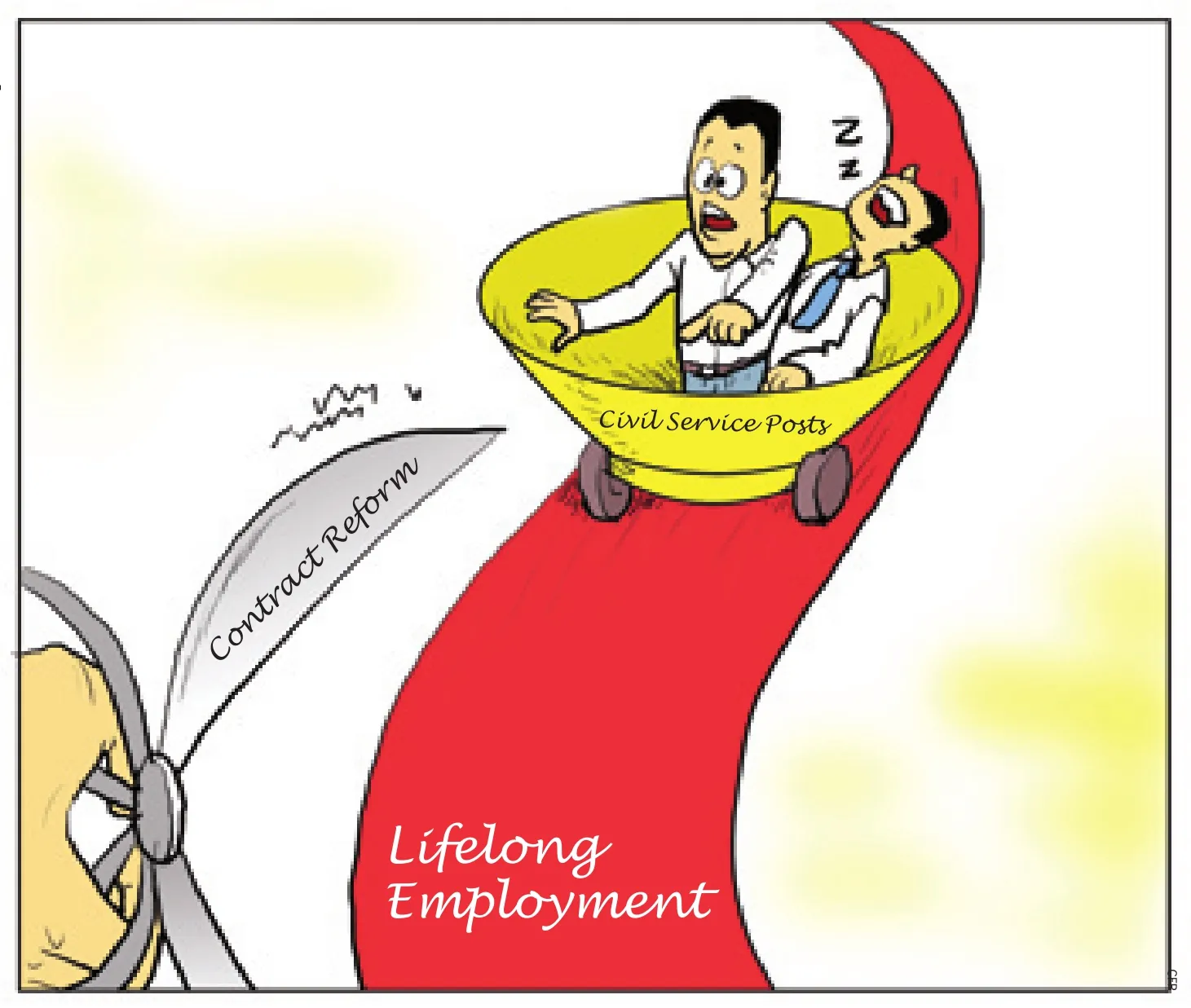Iron Rice Bowl Becomes Ceramic
2013-10-14ByLiLi
By Li Li
Iron Rice Bowl Becomes Ceramic
By Li Li
Governments pilot reforms to stimulate officials’ performance and stream line civil service
T he “iron rice bowl” of guaranteed job security and enviable benefits for Chinese public sector em p loyees is showing cracks.
Since the beginning of this year, local governments across Hunan Province have been using webcams and tiny “pinhole” cameras to secretly record government officials. Some were caught sleeping, playing games, and watching online videos during work hours.
One caught a government official in Chenzhou viewing a pornographic webpage during office hours. The candid clip appeared in a China Central Television news broadcast, and led to him being removed from his post.
While Hunan’s efforts to weed out laziness in government offices have been praised by the public as a strong deterrent, their astonishing m isbehavior also enraged some netizens, who have been calling for more permanent forms of supervision to keep officials from wasting time and taxpayers’ money.
Long-awaited reform
For years, people in China have been demanding more effective monitoring and evaluation of bureaucrats and reforms on their employment system to keep them better motivated.
For a long time after 1949, large numbers of urban employees in China relied upon public finance for salaries, be they government officials or employees of state-owned enterprises.
A dividing line was drawn in the late 1980s when labor contracts were adopted to facilitate the reform of state-owned enterprises. “Breaking iron bowls” was hailed as a landmark move to end“egalitarianism” and encourage competition in the job market.

The reform later spread to public institutions affiliated to governmental departments in the 1990s when permanent employment was replaced by labor contracts.
However, administrative agencies have been untouched by the reform and remain as places where employees are guaranteed to work till their retirement age as long as they are not removed for m issteps.
Meanwhile, civil servants are found in a welldefined ranking system. The rank of a civil servant determines which positions he or she may assume in the government, how much political power he or she gets, and the level of benefits in transportation and healthcare.
To optimize the current civil service management system, in recent years many Chinese cities,including Beijing and Shanghai, have launched pilot programs of employing civil servants on contract.
On June 2, Beijing launched a nationwide recruitment campaign for six senior executive positions in three municipal government agencies,offering an annual salary of no less than 200,000 yuan ($32,600) to each. However, those positions are not government jobs for life, as the two- or three-year-long contracts not only have probationary periods varying from three to six months, but also can be term inated should the person fail a performance evaluation.
According to China’s Civil Service Law that took effect in 2006, contract-based employment should be applied to two kinds of posts: those requiring professional expertise and those providing general services.
Unlike the annual civil service exams at national and local levels where most vacancies require applicants to be recent college graduates, under most pilot programs, government posts with high requirements on candidates’ expertise in certain fields are publicized to attract experienced professionals.
Zhangzhou is the first city in southeast China’s Fujian Province to conduct such a pilot program.Last May, the city hired an urban planning professional and petrochem ical engineer on three-year contracts for its Gulei Econom ic Development Zone. The job description of the petrochemical en-gineer required him or her to take part in designing the layout of a petrochemical industrial park.

The two contracted government employees are paid 6,000 yuan ($978) a month, which is considerably higher than salaries of their colleagues.However, they are under harsher evaluation standards as the contracts mandate that they would be fired if they do not pass appraisals.
Xiamen, another city in Fujian, recruited the first batch of contracted civil servants last year. Five people have been hired by the city’s Landscaping Bureau, Bureau of Construction, Office of External Affairs and Bureau of Public Security. Three of them have a master’s degree and one has 20 years of experience. Their monthly salaries are all above 10,000 yuan ($1,630).
The city’s Bureau of Civil Service said there are two reasons that these contract-based employees earn much more than their colleagues of identical rank. First, part of their monthly income is deducted to inject into a pension fund; other civil servants’pensions are paid from public coffers. The second reason is to use competitive compensation to attract the most qualified professionals in their fields.
Far from enough
Shenzhen, a boom town in south China’s Guangdong Province, was the first city in the country to recruit contracted civil servants in 2007.
After a more than two-year trial period on certain posts, all new hires in law enforcement and technical service categories of Shenzhen’s civil service have been hired according to contracts rather than appointments.
The Civil Service Law of China states that posts are classified into three categories of general management, technical service and adm inistrative law enforcement. In February 2010, Shenzhen announced plans to decouple rank from pay or benefits for nearly 70 percent of local civil servants who belong to the latter two categories.
The new system would offer chances for civil servants to improve their abilities and increase their incomes based on job performances and professional skills, said Wang Min, Director of Shenzhen’s Human Resources and Social Security Bureau,according to a Xinhua News Agency report on February 6, 2010.
Wang Yukai, a professor at the Chinese Academy of Governance, told newspaperLegal Weeklythat designing different career paths for civil servants of different categories could benefit China’s drive to build a highly qualified and professional civil service workforce.
While the contract system was originally introduced to usher in competition to stimulate the civil service delivery, Shenzhen’s contractually hired civil servants have been stable—maybe too stable.
According to official records, since 2007, more than 3,200 contracted civil servants have been hired in Shenzhen and not a single one has been fired. The city now has about 40,000 government employees.
An anonymous official from Shenzhen’s Human Resources and Social Security Bureau told newspaperBeijing Timesthat civil servants employed on a contractual basis do not face a high risk of being laid off compared with their appointed colleagues.
Zhu Lijia, another professor at the Chinese Academy of Governance, toldLegal Weeklythat the public should not have excessively high expectations for the trials to remove underperformers.
He said that since the trials leave the majority of the civil service workforce untouched, the dismissal of this new breed of government employees would not be easy as the broader civil servant appraisal and dismissal mechanism has been ineffective and deserves an overhaul.
Some experts also said that the pilot programs are limited in their effect on reforms to increase the flexibility of civil service posts.
Li Jianzhong, a senior research fellow with the Chinese Academy of Personnel Science, said that the reform involving contracted civil servants should be promoted in three ways. First, the types of posts should be diversified. Second, there should be strict regulations governing who can renew their contracts. Third, supportive reforms should be launched, such as allowing contracted civil servants to retire early and setting up a pension fund for them to facilitate the free flow of professionals into and out of the civil service workforce.
Song Shim ing, a professor at the Chinese Academy of Governance, participated in drafting the Civil Service Law. He said that there are seven ways that a government employee could leave civil service: disqualification at the end of probation,expulsion, resignation, dismissal, retirement, layoff and death. Song said that the conditions for firing civil servants are not clarified in the Civil Service Law and should be stated in detail in implementation regulations.
Liu Xia, a senior research fellow with the Chinese Academy of Personnel Science, said that those civil servants who were found playing mahjong or going to entertainment venues during office hours should be fired.
She said that the withdrawal mechanism for the civil service workforce should be based on a strict appraisal system, efficient supervisory system and effective enforcement of these systems.
China has a colossal civil servant workforce of more than 6 m illion people. Statistics from the State Adm inistration of Civil Service in 2011 showed that only 4,778 civil servants were fired from 2006 to 2010.
Liang Yuping, a senior research fellow of Chinese Academy of Personnel Science, said that China should clearly define the three categories of posts and make adm inistrative law enforcement a priority category for contract-based employment reform.
Liang said that as many civil service posts require stable and long-term service, it is impossible to totally replace the appointment-based employment system with a contract-based one.She believes that the ultimate goal of the reform is to apply both systems to keep all civil servants motivated and raise the overall efficiency of delivering service.
